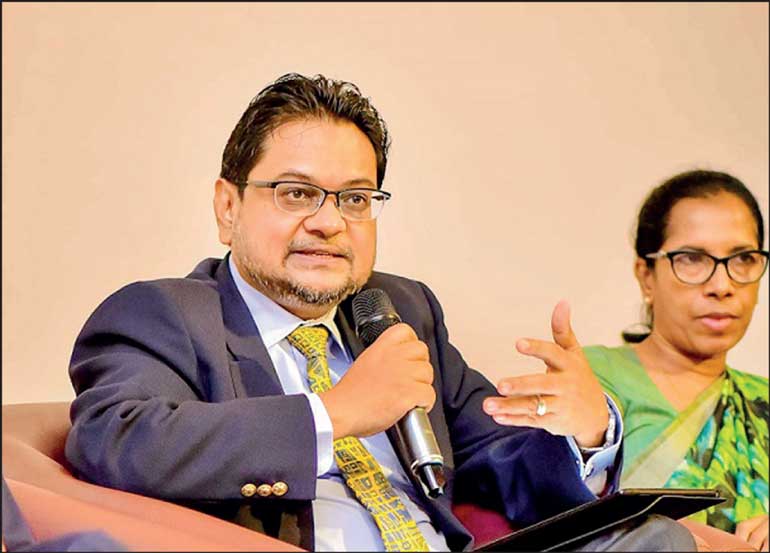Saturday Feb 21, 2026
Saturday Feb 21, 2026
Wednesday, 15 November 2023 01:34 - - {{hitsCtrl.values.hits}}

By Charumini de Silva
Verité Research Executive Director Dr. Nishan de Mel yesterday shared a critical assessment of Budget 2024, describing it as another “fairytale” with promises of revenue that lack grounding in reality.
Speaking at CA Sri Lanka’s Annual Budget Seminar 2024 he urged private sector associations to take the lead in professionalising tax compliance, budgeting and planning processes to break away from past practices to rebuild the economy.
“Delivering the Budget speech President mentioned ‘no fairytale’ in the 2024 Budget noting there are no promises. However, the 2024 Budget is also just another ‘fairytale’ with promises of revenue that are not grounded in reality,” he said.
He explained that the challenge lies not in the numbers themselves, but in navigating through them. “Sri Lanka has not met its revenue targets for the past 23 years since 2000. The budget revenue targets are missed by 10-12-% every year. If you are smart, you will automatically assume it will fail by 10-12-%. The budget forecasts a 45% increase in revenue for 2024, following an anticipated 65% rise in the 2023 Budget. Therefore, we need to change that culture and habit of budgeting, which will improve the planning and outcome,” he added.
Expressing concern about the potential repercussions of false assumptions, Dr. de Mel highlighted the risk of sudden VAT increases and the inability to afford essential expenditures later in the year. He underscored that the entire revenue reduction was extracted from capital expenditure, diminishing the buffer for crucial investments in the coming year.
He also claimed that the Government has never met a revenue target and most of the time the capital allocation is used to make up the gap. “The important thing is to get the planning right,” he added.
Regarding revenue sources, he noted that 88% of the dependence is on VAT and import taxes. “The tax revenue is going up by 47% of that 59% of that increase is trying to come from the VAT. Dependence on VAT and import taxes is 88% and of that, 84% is from the VAT increase in import goods and services,” he added.
Dr. de Mel raised concerns about the extreme dependency on high-value imports, stressing that the VAT estimation has tripled from Rs. 220 billion to Rs. 660 billion.
Criticising the budget proposals as akin to political statements, Dr. de Mel urged for economic analyses accompanying each proposal.
He called on CA Sri Lanka — the national body of accountants, to subject the budget to a rational analysis to ensure the coherence of revenue projections.
Asserting the need to increase revenue to GDP currently at 8% to at least 15%, he urged proactive measures for tax compliance. He also cautioned against celebrating reduced taxes, as inflation may offset this benefit in the future.
“We should be careful in what we are celebrating today. People celebrate that taxes did not rise from the budget, but you will pay through inflation eventually. However, widening the tax net is critical,” he said.
Referring to the President’s directive that all professionals must register for taxes with a team member and a deadline, Dr. de Mel suggested that private sector associations in the country must take the lead.
“Now, does the President have to pass a law for that? Can’t there be voluntary compliance?” he argued, calling for a voluntary approach to encourage collective responsibility for the economic revival.
Acknowledging that the Inland Revenue Department (IRD) has not been successful in increasing tax collection, he urged the broader society, including businesses and professionals, to step in.
He cautioned that continuing to collect taxes without an economic basis for “private interests” could lead to adverse consequences for businesses themselves.
“There has to be a real interest in Sri Lanka, especially among professionals, for a change, to set a goal and direction for the economy — this shift is quite critical. I have proposed to increase withholding tax (WHT) from 5% to 10%, but the accounting fraternity resists it. Increasing the WHT is one of the ways to catch people not in the tax net. People who resist the WHT are the ones who do not want to be in the tax net and that is destructive to the economy,” he claimed.
Commenting on public sector expenses, Dr. de Mel pointed out that Sri Lanka has the 10th highest military expenditure globally based on per capita, whilst proposing adopting a reserve-based approach for military personnel, allowing them to contribute to the economy when not on active duty.
“Around 48% of wages in 2022 from the public sector was in the defence sector. Now, that hurts the rest of the public sector which we need to pay better. I think we pay the public sector far too little. If we don’t pay them well, we can’t get new staff or equally competent employees.
He cited that Sri Lanka is one of the countries that have become less competent, even after investing heavily over decades compared to other countries. He said the public sector is critical because they do all planning and strategy for the country and not even the private sector can succeed.
Shifting the focus to the pressing issue of interest costs, estimated at $ 250 billion, Dr. de Mel predicted a further increase in 2024 beyond the planned figures in the IMF program.
“In 2023, our interest cost to the Government is 70%, highest in the world. The least painful way to deal with it is debt restructuring with ‘private bondholders’ with a 50% haircut. Earlier, we predicted a 30% haircut, but given the higher interest costs, we should target 50%. This is our last chance to switch out of this vicious cycle to achieve debt sustainability,” he said.
Pix by Ruwan Walpola